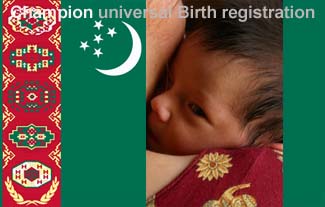
More progress on statelessness in Central Asia as Turkmenistan becomes latest country to champion universal birth registration
UNHCR, the UN Refugee Agency, welcomes a new law in Turkmenistan which will help ensure that all children born in the country will have their births registered. The Law on Civil Status Acts, which entered in to force in July, will help prevent new cases of statelessness arising for children born to people who are undocumented or whose nationality is undetermined.
The new law is the latest in a series of significant developments taken by Turkmenistan to prevent and reduce statelessness in the country, including the adoption of an ambitious National Action Plan to End Statelessness (2019-2024) which was formally endorsed by the President of Turkmenistan in January last year.
Over the last 15 years, an estimated 23,000 refugees and stateless people have been granted Turkmen nationality. These include some 10,000 stateless people who have been naturalized since the country’s accession in 2011 to the 1954 Convention relating to the Status of Stateless Persons.
“We applaud the progress made by Turkmenistan in honoring its commitment to tackle statelessness. It follows a number of advances being made in the region to resolve this issue,” said Yasuko Oda, UNHCR Representative for Central Asia.
Last year, the Kyrgyz Republic became the first country in the world to end all known cases of statelessness on its territory, Kazakhstan also amended its legislation to ensure universal birth registration and Tajikistan enacted a special time-bound Amnesty Law for stateless people and foreign citizens so they can regularize their status.
In April this year, Uzbekistan also enacted a new citizenship law which will help confer citizenship for some 50,000 stateless people.
“As part of its global #iBelong Campaign to End Statelessness by 2024, UNHCR has been working in close collaboration with governments and partners across the region to prevent and respond to statelessness,” said Oda.
“As a result of the joint efforts of governments, UNHCR and civil society, some 79,000 stateless people in Central Asia have acquired a nationality since 2014. Close to 117,000 people are still known to be stateless across the region, but the actual number is estimated to be higher.”
ENDS





